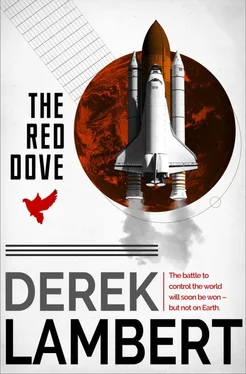In the train he sat beside Brasack who was full of the marvels of the Metro. So much so that Massey began to tire of the mosaics and sculptures sliding past the windows.
‘Such beautiful architecture,’ Brasack breathed. ‘Such heroic achievement.’
‘Then why are they ashamed of it?’
‘What do you mean?’ Brasack fingered his sandy moustache nervously.
‘Why do they keep it all underground?’
Brasack smiled. ‘I see we’re going to have a lot of interesting ideological conversations,’ he said.
They left the train at Byelorusskaya station. For a few moments they stood huddled on the edge of the platform. In the distance they heard the rumble of another train approaching; the platform trembled; the nose of the train emerged from its burrow just as Brasack stumbled against Massey. For a moment Massey teetered on the edge of the platform. Fleetingly he thought: So this is how it is going to end. How mundane. Hands reached for him. He stepped to safety as, with a hiss of brakes, the train stopped. Brasack apologised profusely.
They went to the revolving restaurant half way up the Ostankino TV tower for lunch. Below them Moscow draped in white wraps circled slowly.
From Natasha Uskova, Massey learned that the tower was the tallest structure of its kind in the world. Moscow apparently had many superlatives. The biggest cinema, the largest hotel in Europe, the Rossiya –‘Twenty cafeterias and ten miles of corridors,’ she breathed.
‘So you’re not so different from us Americans,’ Massey said.
He, Natasha and Brasack were led to a table for three. Could it have been pre-arranged? Massey glanced at the toy-bricks of Moscow 1,090 feet below. He said to Brasack: ‘How about you sitting next to the window?’
In the afternoon they visited the treasure chambers of the Kremlin. Stood dazzled by the array of thrones, crowns, carriages, jewel-encrusted robes, vestments and mitres; gold, silver, and precious stones as plentiful as pebbles on a beach.
Quoting from her script, Natasha told them that when he saw these riches the first Soviet Minister of Education had commented: ‘Workers in the museum ate only brown bread but preserved diamonds.’
Back in the lobby of the Ukraina, Brasack suggested a drink. Massey said: ‘Later maybe.’ Brasack looked disappointed.
In his room, No. 2604 overlooking both Kutuzovsky Prospect and the river, he checked to find out if it had been searched. It was one of the lessons he had learned in a crashcourse at the CIA training establishment at Camp Peary between Williamsburg and Richmond, Virginia. That and communications, co-operation with other agencies (in particular Britain’s MI6, Britain being less suspect in Russia than the US), penetration of hostile agencies such as the KGB, encoding and decoding, para-military and psychological (PP) operations, flaps and seals i.e. secretly opening mail, diplomatic pouches, etc.
Even more importantly he had been beckoned into the Soviet Mind through Russians who had been turned. Mind? An enigma. But one thing he had learned from an old Russian who had fled the Stalin purges after World War II:
‘Never doubt their patriotism. That is their strength. Never mind Communism, they joke about it too. But never criticise Mother Russia. Westerners wonder why Russians put up with Communism; they don’t understand – everything, but everything, is endured for Country. All they have ever known is oppression. They expect it and they’ve got it. They’re masochistic patriots. Knock Party as hard as you like, but never country.’
When he had finished speaking the old Russian, who had been a major in the Red Army, had turned away and, with his new knowledge, Massey guessed why. Country.
In between lessons Massey had been reconditioned. Jogging, exercising, swimming, unarmed combat… if he met any jock dropping Tab cans on Padre Island Beach now he would break him in half.
He had also been interrogated via a polygraph to see if he had any tendencies that could abort the operations, apart from disorientation in space, that was. They had attached a cuff to his arm to measure blood pressure and pulse variations, a band round his chest to register changes in respiration and electrodes to his hands to measure his sweat output, and asked him questions. Scores of them. Then they had taught him how to beat the polygraph.
He decided that his room had been searched. Objects such as his attaché case in the wardrobe that the maid needn’t have touched had been marginally moved – he had checked their alignment with scratches on the walls; the pen in the inside of his jacket that had covered the first B of Brooks Brothers on the tab now covered an O; there were tiny, finger-tip whorls in the dust above the cupboard drawers where he had put his shirts and underclothes. The search hadn’t been particularly professional, but they hadn’t expected a professional to check them out. At least that was reassuring.
Massey wondered where they had placed the bugs. He surveyed the room. The furnishings were an incongruous clash of heavy wood and cheap plastic. The plastic lightshade was printed with pink roses; probably a microphone up there somewhere; another possibly in the bed-head; almost certainly one in the bedside telephone. According to the agent who had trained him at Camp Peary a whole floor of the Ukraina was set aside for surveillance equipment; all the eavesdroppers had to do was activate the connection to a particular room and listen. ‘Don’t make the mistake businessmen make,’ the agent had warned. ‘They wait till they get in their car to mouth their indiscretions. But, of course, the car’s bugged, too.’
Massey didn’t bother to try and locate the microphones; it would only arouse suspicion and, in any case, he wouldn’t be in the room much longer. He glanced at his watch: 8 p.m. He planned to leave at nine, although Natasha Uskova wouldn’t like it – dinner was scheduled for tonight at the National.
A knock at the door.
‘Who is it?’ Massey called out.
‘It’s me, Natasha.’
Which wasn’t scheduled.
Massey opened the door.
‘May I come in?’
‘I was just going out,’ Massey said.
But she was in the room, smiling, closing the door behind her. She wore a dark blue skirt and a white blouse. ‘I like to visit all the members of my party,’ she said, sitting down on the only chair in the room and crossing her legs, ‘to see if there’s anything they want.’
Massey looked at her legs, good legs, wondering if he had just been propositioned.
‘Is there anything you want, Gaspadeen Massey?’ She hitched her skirt up her thighs; if this was seduction Soviet style it was pretty basic.
The words of another of his Camp Peary advisers came back to him. ‘Don’t kid yourself that you’ll be above that sort of thing, Bob. We had a saying at college – a standing prick knows no conscience.’
‘Everything’s just fine,’ he told Natasha Uskova.
‘I think Gaspadeen Brasack would like to be friends with you.’
‘And me with him. Only not too friendly.’
Scintillating stuff for the eavesdroppers. Massey sat on the edge of the bed. From there he could just see the tops of her stockings. The most traumatic day of his new life and he was looking up a girl’s skirt… ‘ knows no conscience.’
‘Are you enjoying Moscow?’ she asked.
‘What I’ve seen so far is beautiful,’ he said truthfully.
‘Not how you imagined it? Nor was New York how I imagined it. It’s bad PR on both sides of the Atlantic. Western photographers always take pictures of Russians with their heads bowed into a blizzard to show what a miserable existence they lead. How would the photographers look, bowed into a blizzard? And Soviet cameramen search the sidewalks for fat Americans smoking cigars.’ Had she forgotten the eavesdroppers? ‘Would you like a drink, Mr Massey?’ dropping the Gaspadeen. ‘On Intourist, of course.’
Читать дальше
Конец ознакомительного отрывка
Купить книгу












